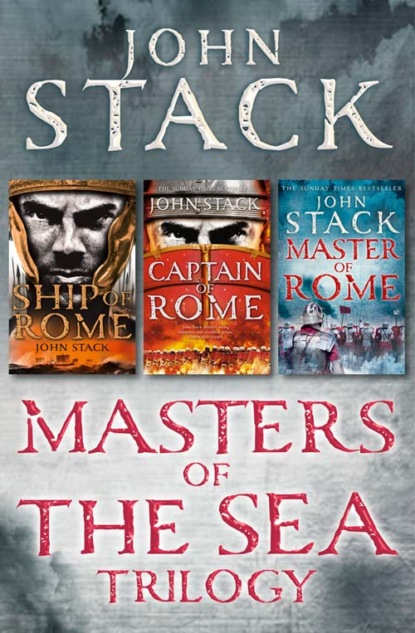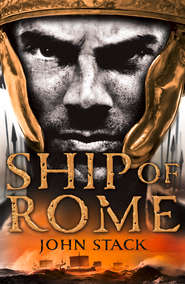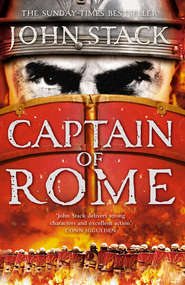По всем вопросам обращайтесь на: info@litportal.ru
(©) 2003-2025.
✖
Masters of the Sea Trilogy: Ship of Rome, Captain of Rome, Master of Rome
Автор
Год написания книги
2019
Настройки чтения
Размер шрифта
Высота строк
Поля
The day dawned six hours later to find Atticus and Septimus on the aft-deck of the Aquila once more. The captain had awoken just before dawn as always, a habit born during his years as a seaman when the rising of the sun marked the change in the watch. He had dressed quickly and gone on deck to find the marine centurion already there. The two men discussed the events of the past two days but, as if by mutual consent, they avoided discussing the battle, each man having formed his own firm resolutions, inner promises that spoke of retribution and the heavy price to pay.
Septimus paused in the conversation to look around him. The ship was surrounded on all sides by the sea, an unfamiliar sight as the Aquila normally spent her time in coastal waters. The course of the ship seemed directionless, as if it were merely passing over the waves without a destination in mind. The thought unnerved him.
‘What’s our course?’ he asked, knowing that in general they were heading to Rome but wanting to hear specifics that would indicate that Atticus knew exactly how they would get there.
‘We’re travelling due north across the Tyrrhenian Sea, along the trading sea-lane to Naples. We will intercept the coast a little south of that city and then head northwest along the coastline to Rome.’
Septimus noted the easy confidence of the captain.
‘I’ve never been on a ship out of sight of land before,’ the centurion added, the featureless sea providing no visible point of reference.
Atticus turned towards the centurion and smiled.
‘My first time was when I was eight,’ he remarked, ‘and I was alone. I was fishing near the shore in my skiff when a storm blew up. It would have taken my sail away but I managed to secure it and weather out the squall until nightfall. By that time I had been carried out to sea.’
‘How did you survive?’ Septimus asked, trying to remember what it was to be eight.
‘I followed the stars home,’ Atticus replied matter-of-factly.
The captain smiled inwardly at the easy description of his escape, a contrast to the unmitigated terror he had actually felt at the time.
‘Even at eight you could navigate by the stars?’ Septimus asked, doubt in his mind that a young child could achieve such a thing.
‘Septimus, one of the first things I remember is my grandfather teaching me about the stars. He said they were the fisherman’s greatest ally against the fickle nature of the sea. The sea is uncertain, but the stars are constant, and a fisherman can trust them with his life. I trusted them that night and I survived.’
‘Give me land and a solid road under my feet any day,’ Septimus said, knowing he would never possess the skill that Atticus had at sea, an ease born out of a lifetime of pitting his wits against the sea and winning through every time.
‘And give me a fair wind and a good ship,’ Atticus replied.
Septimus smiled at the rebuttal and turned to walk down to the main deck and the assembled troops of his command. The men were subdued, their flight from the previous day’s battle a bitter shame. Septimus sensed the mood, weighing the impact on his men. Routine was a commander’s greatest ally and, for Septimus’s marines, routine dictated that each day began with combat training. Within thirty minutes they would be sweating heavily under the strain of full combat training, the concentration required clearing their mind of dissension. The men formed ranks and began to warm up. The moves they practised had been performed many times before, but Septimus had taught them that any lesson that might one day save your life was worth learning again and again.
The sweat was streaming down the marine centurion’s back by the time he disengaged from the training fight with his optio, Quintus. The younger man was also breathing heavily, the sudden burst of speed required to fend off the centurion’s attacks sapping him.
‘Good,’ Septimus said, between breaths, ‘very good.’
All around them the men of the marine century were paired up, each group fighting with the heavy wooden training swords that would build the muscle of all and bruise the limbs of the careless. Septimus had them practising a reverse thrust and the men now incorporated that move into their ever-expanding range of skills.
‘Take over, Quintus,’ Septimus said, before bending down to pick up his tunic, the garment discarded an hour before when the sun was two hours above the horizon. As he walked towards the aft-deck, the cooling sea breeze felt fresh over his toned body, his mood light after the morning’s exercise.
The consul was standing to one side on the aft-deck, two of his guards and the tall Nubian slave in attendance. As Septimus crossed the main deck he felt Scipio’s scrutiny, and the consul turned and spoke a few words to the unmoving Nubian beside him. The slave nodded, his eyes never leaving Septimus. The centurion mounted the aft-deck and walked towards Atticus at the ship’s rudder. The captain was issuing orders to a group of crewmen and, as Septimus approached, the sailors dispersed, fanning out over the ship as each went to the task assigned to him. Atticus looked up at the broad sail, an almost instinctive repetitive look to check and recheck the line of the sail, the angle of the wind, the tension in the running rigging and all the other myriad of minutiae that occurred simultaneously as a ship sped over the water.
‘How long has the consul been there?’ Septimus asked.
‘About half an hour. He’s been watching your men train. Seems to be discussing the training with his slave.’
Septimus nodded, knowing a summons was coming before the words were spoken.
‘Centurion!’ he heard, and spun around to see the consul beckoning him with a raised hand.
Septimus crossed the aft-deck and stood to attention before Scipio.
‘Your men are impressive, you train them well,’ the consul said coolly. Septimus could sense the undertone of challenge.
‘Thank you, Consul.’
Scipio seemed to study the centurion before him, weighing some unknown factors in his mind.
‘I would like you to fight my slave. He is a gladiator from my own school and would relish the challenge.’
‘I would welcome the opportunity, Consul,’ Septimus replied, and once more saluted Scipio before leading Khalil to the main deck. He caught the eye of Atticus as he went. Atticus had trained Septimus in one-to-one combat when the centurion had first come aboard the Aquila, but within three months the former legionary’s natural swordsmanship had surpassed Atticus’s median skills. It had been some time since Atticus had seen Septimus bested in a fight. He smiled broadly in anticipation.
The marines ceased training as they noticed the pair approaching, their purpose obvious as Septimus once more removed his tunic and began to limber up. They quickly formed a semicircle at the fore end so all could see the impending fight, the whispered bets and calls of encouragement steadily growing in intensity as Khalil removed his own tunic to expose his massive frame. Odds were renegotiated as the slave picked up a wooden training sword, his obvious comfort with the weapon a sign that he was familiar with it. All activity on the ship seemed to cease as the two men came toe to toe.
‘What’s your name, slave?’ Septimus asked, the last word spat in derision to raise the ire of his opponent.
‘Khalil.’
‘Well, Khalil, I will teach you a lesson or two today,’ Septimus taunted as he began sidestepping to his right, opening a circle of two arms’ length.
‘Not before I shame you in front of your men, Roman,’ Khalil replied, menace in his voice.
Septimus was shocked by the threat, the audacity of the slave to speak so aggressively to a freeman.
Khalil registered the surprise on the centurion’s face and used the moment to attack. Septimus was caught off guard and was forced to backstep as the Nubian’s blows came in fast and high. The centurion cursed himself for the momentary lapse in concentration; the simple trick of the Nubian had broken his thoughts and exposed him to the incisive attack.
Septimus counterattacked, parrying the Nubian’s blade before striking low, aiming to unbalance his opponent and go on the offensive. Within seconds he knew he was evenly matched. Septimus had years more experience with a sword, but much of that was in the legions, with only ten months of one-on-one combat training. Khalil had over twice that amount in single-combat training, his tutors the best gladiatorial trainers that Scipio’s money could buy. Septimus had balance and timing on his side, Khalil had practised technique – and each man tried to force the fight into their realm of strength.
Septimus stepped back again as Khalil flowed into a twelve-stroke sequence, a seamless series of blows that twice penetrated Septimus’s defence on the torso and upper thigh. Septimus grunted as each blow struck, the heavy wooden sword raising the purple hue of bruising under the skin. Septimus counterattacked with a series of his own; the strokes were less defined than Khalil’s, but the Nubian was forced to react quickly to avoid injury. Septimus kept the pressure up, never allowing the Nubian to pause between attack and counterattack. The unrelenting pace began to take its toll and Khalil grunted heavily as Septimus punched the hilt of his sword into his stomach. The gladiator roared in anger as he attacked again, but Septimus used his superior balance as a defence, causing Khalil to overreach on the final strike, opening the opportunity for Septimus to immediately go on the offensive.
Atticus watched in silence from the forward rail of the aft-deck. At the beginning of the fight he had cheered Septimus along with the rest of the crew, but now he watched in avid fascination as the fight developed. The balance between the two men was incredible. After nearly ten minutes of fighting, Khalil was clearly feeling the effects of the extended fight in his sword arm. His strikes were not as fast as before; however, the sequencing was every bit as deadly, and Septimus was struggling to fight off another attack.
Both men fought on, sweat streaming from every pore, every strike now accompanied by a grunt of exertion from attacker and defender. A killer blow was yet to be struck, but both showed signs on their bodies of where defences had been overcome and their flesh had suffered the lash.
‘Enough!’
All eyes turned to the source of command; all except the two fighters, who backed off imperceptibly, their gazes locked, their chests heaving in unison. Scipio descended to the main deck and approached the fighters. He eyed them both slowly, as if balancing them in his mind, his thoughts advancing the fight to an unseen conclusion.
Before the fight, Scipio had been sure of Khalil’s superior skills. Within seconds of the beginning, however, his keen eye had discovered the gladiator’s obvious disadvantage. Gladiatorial fights were rarely to the death, and rarer still for fighters of Khalil’s calibre, when swordsmanship was the attraction of the contest. The centurion, on the other hand, had fought many times when death was in the offing and knew of no other way to fight. For the centurion it was kill or be killed; for the gladiator it was draw first blood and claim victory. Without that exposure to mortal danger, Khalil would never be the centurion’s equal. Scipio was sure, however, that in a fight to the death Khalil’s steely ferocity would adapt, and no man, certainly not a brute centurion of the marines, would stand against him.
‘You fight well, Centurion,’ Scipio said, his voice betraying the hollow words.
‘Thank you, Consul,’ Septimus replied, drawing himself to attention.
Scipio nodded his head curtly to Khalil and turned towards the hatchway to the cabins below. He descended without another word, his personal guard and the Nubian slave following. Only when they were gone did the marines break the silence, the abrupt end to the fight sparking immediate arguments as to the victor and how the bets would be settled.
Septimus let them argue, his eyes never leaving his assailant, even when all that remained was an empty hatchway. He had never fought a man of such ability, and he rolled his shoulder instinctively against the sharp pain of a heavy bruise on his upper arm. Throughout the rest of the day he waited for the slave to return from the decks below so he could discuss the fight and the incredible sequence of strikes that seemed so effortless. He waited in vain, for neither Khalil nor the consul re-emerged.
Atticus could scarcely believe the sight before him. Everywhere he looked the sea was filled with all manner of ships, from the smallest skiffs, through merchant galleys, to the massive transport barges of the grain trade. Atticus felt an overwhelming sense of movement, of constant frenzied activity as ships travelled in all directions, their courses crisscrossing each other, with some setting sail for distant ports while others were reaching their journey’s end here, in Ostia, the port town of the city of Rome.









